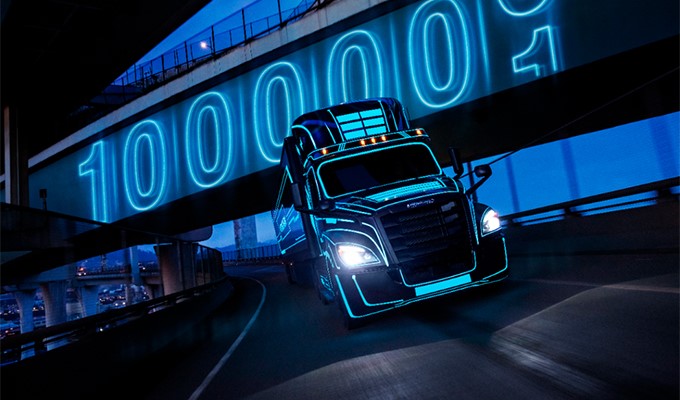Daimler Trucks North America (DTNA) announced its Freightliner battery electric Innovation and Customer Experience (CX) Fleets have reached 1 million miles of real-world usage, with fleets operating across the West Coast and Canada. With order boards for the eCascadia and eM2 open earlier this year, DTNA has seen demand for its electric trucks.
“We have reached a tipping point in our electrification journey,” says Rakesh Aneja, vice president and chief of eMobility, DTNA. “After a million miles of learning in close collaboration with our valued customers, we are ready to move from prototype to scale—from tens of customer experience trucks to hundreds of production units. We remain committed to continuously improve our vehicle technology, reduce cost of ownership, and support infrastructure development—the required trifecta for a successful electrification transformation.”
TESTING IN REAL LIFE WITH REAL CUSTOMERS
Comprised of over 40 BEV Freightliner eCascadias and eM2s, Freightliner Electric Innovation and CX Fleets have transformed the testing process. Freightliner supplied trucks to almost 50 customers to accumulate experience while performing real work in real commercial vehicle applications.
The nation’s leading fleets, including Penske Truck Leasing, NFI, Hub Group, Knight-Swift, Schneider, XPO, Ryder, J.B. Hunt, and UPS, along with specialized fleets such as Loblaw Companies Limited, Sysco, Southern California Edison, Fastenal, Temco Logistics, Bison Transport, Core-Mark, Costco Wholesalers, Iron Mountain Inc., KeHe Distributors, Mondelez International Inc., US Foods, and Velocity Truck Rental & Leasing have all contributed to the development of Freightliner’s electric Class 8 and Class 6/7 trucks.
Participation in the Innovation and CX Fleets and being an active part of DTNA’s Electric Vehicle (EV) Council provided those companies a chance to test integration of battery electric trucks into their own fleets and to share their learnings and experiences openly amongst all customers. The South Coast Air Quality Management District (South Coast AQMD) supports the fleets. South Coast AQMD focuses on improving air quality in the South Coast Basin of Southern California; the entity also partially funded the project.
Freightliner’s Electric Innovation Fleet began in 2018. At the time, electric trucks ran drayage and regional-haul routes in Southern California with Penske and NFI. Then in 2020, the CX Fleet began with additional vehicles. The vehicles have rotated between various customers in both the US and Canada for the past year. Both fleets have now hit 1 million accumulated testing miles.
IMPORTANT LEARNINGS FOR SERIES PRODUCTION
From collecting driver feedback, comparing the relative impact of driver behavior, temperature, weather, and weight between multiple fleets and duty cycle to assessing wear, testing charging equipment behavior, and readying the service network, DTNA gained tremendous operational learnings that will apply to the production vehicles delivered to customers in late 2022.
Andreas Juretzka, head of electric mobility product development at DTNA, says, “Our rigorous testing has revealed powertrain and auxiliary components, including HVAC, thermal management, and low voltage electrical, are high performing and more than up to the job. One lesson stands out in particular: the importance of regenerative braking to maximize range. Across the pilots, the average recuperation ratio was 20-25%, with some drivers achieving even up to 30%.”
Testing electric trucks in real conditions with real fleets validated and reaffirmed many of the expected benefits of electric trucking. These benefits include reduced driver fatigue as well as minimal noise and vibration.
ELECTRIFICATION BEYOND THE VEHICLE
DTNA’s commitment to electrification goes beyond the truck. With the Detroit eConsulting team, DTNA’s customers will see a streamlined process when electrifying their fleets and navigating charging infrastructure. The Detroit eConsulting team navigates some of the key challenges fleets will experience. These challenges include route assessment, coaching driver behavior, optimizing in-cab experience, and planning and installing charging equipment.
In May of this year Detroit also launched Detroit eFill chargers, a full line of commercial vehicle charging stations designed for seamless integration with the Detroit ePowertrain found in the Freightliner eCascadia and eM2 trucks. Detroit eFill stations were developed in partnership with Power Electronics, the leading North American supplier of converters for utility scale solar, and feature the ability to charge a wide range of electric vehicles from other brands.
Find out more, visit www.freightliner.com.




